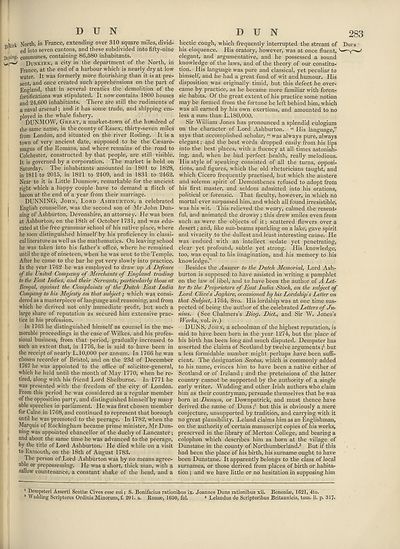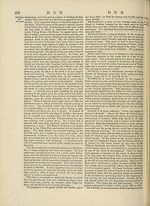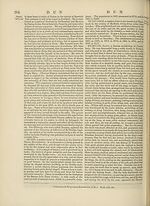Encyclopaedia Britannica > Volume 8, DIA-England
(293) Page 283
Download files
Complete book:
Individual page:
Thumbnail gallery: Grid view | List view

DUN
i rk North, in France, extending over 310 square miles, divid-
11 eci into seven cantons, and these subdivided into fifty-nine
Dtiing- communes, containing 86,580 inhabitants.
Dunkirk, a city in the department of the North, in
France, at the end of a harbour which is nearly dry at low
water. It was formerly more flourishing than it is at pre¬
sent, and once created such apprehensions on the part of
England, that in several treaties the demolition of the
fortifications was stipulated. It now contains 1800 houses
and 24,600 inhabitants. There are still the rudiments of
a naval arsenal; and it has some trade, and shipping em¬
ployed in the whale fishery.
DUNMOW, Great, a market-town of the hundred of
the same name, in the county of Essex, thirty-seven miles
from London, and situated on the river Roding. It is a
town of very ancient date, supposed to be the Cmsaro-
magus of the Romans, and where remains of the road to
Colchester, constructed by that people, are still visible.
It is governed by a corporation. The market is held on
Saturday. The inhabitants amounted in 1801 to 1828,
in 1811 to 2015, in 1821 to 2409, and in 1831 to 2462.
Near to it is Little Dunmow, remarkable for the ancient
right which a happy couple have to demand a flitch of
bacon at the end of a year from their marriage.
DUNNING, John, Lord Ashburton, a celebrated
English counsellor, was the second son of Mr John Dun¬
ning of Ashburton, Devonshire, an attorney. He was born
at Ashburton, on the 18th of October 1731, and was edu¬
cated at the free grammar school of his native place, where
he soon distinguished himself by his proficiency in classi¬
cal literature as well as the mathematics. On leaving school
he was taken into his father’s office, where he remained
until the age of nineteen, when he was sent to the Temple.
After he came to the bar he got very slowly into practice.
In the year 1762 he was employed to draw up A Defence
of the United Company of Merchants of England trading
to the East Indies, and their Servants, particularly those at
Bengal, against the Complaints of the Dutch East India
Company to his Majesty on that subject; which was consi¬
dered as a masterpiece of language and reasoning, and from
which he derived not only immediate profit, but such a
large share of reputation as secured him extensive prac¬
tice in his profession.
In 1763 he distinguished himself as counsel in the me¬
morable proceedings in the case of Wilkes, and his profes¬
sional business, from that period, gradually increased to
such an extent that, in 1776, he is said to have been in
the receipt of nearly L.10,000 per annum. In 1766 he was
chosen recorder of Bristol, and on the 23d of December
1767 he was appointed to the office of solicitor-general,
which he held until the month of May 1770, when he re¬
tired, along with his friend Lord Shelburne. In 1771 he
was presented with the freedom of the city of London.
From this period he was considered as a regular member
of the opposition party, and distinguished himself by many
able speeches in parliament. He was first chosen member
for Caine in 1768, and continued to represent that borough
until he was promoted to the peerage. In 1782, when the
Marquis of Rockingham became prime minister, Mr Dun¬
ning was appointed chancellor of the duchy of Lancaster;
and about the same time he was advanced to the peerage,
by the title of Lord Ashburton. He died w hile on a visit
to Exmouth, on the 18th of August 1783.
Ihe person of Lord Ashburton was by no means agree¬
able or prepossessing. He was a short, thick man, with a
sallow countenance, a constant shake of the head, and a
dun 283
hectic cough, which frequently interrupted the stream of Durs
his eloquence. His oratory, however, was at once fluent,
elegant, and argumentative, and he possessed a sound
knowledge of the laws, and of the theory of our constitu¬
tion. His language was pure and classical, yet peculiar to
himself, and he had a great fund of wit and humour. His
disposition was originally timid, but this defect he over¬
came by practice, as he became more familiar with foren¬
sic habits. Of the great extent of his practice some notion
may be formed from the fortune he left behind him, which
was all earned by his own exertions, and amounted to no
less a sum than L.180,000.
Sir William Jones has pronounced a splendid eulogium
on the character of Lord Ashburton. “ His language,”
says that accomplished scholar, “ was always pure, always
elegant; and the best words dropped easily from his lips
into the best places, with a fluency at all times astonish¬
ing, and, when he had perfect health, really melodious.
His style of speaking consisted of all the turns, opposi¬
tions, and figures, which the old rhetoricians taught, and
which Cicero frequently practised, but which the austere
and solemn spirit of Demosthenes refused to adopt from
his first master, and seldom admitted into his orations,
political or forensic. That faculty, however, in which no
mortal ever surpassed him, and which all found irresistible,
was his wit. This relieved the weary, calmed the resent¬
ful, and animated the drowsy ; this drew smiles even from
such as were the objects of it; scattered flowers over a
desert; and, like sun-beams sparkling on a lake, gave spirit
and vivacity to the dullest and least interesting cause. He
was endued with an intellect sedate yet penetrating,
clear yet profound, subtle yet strong. His knowledge,
too, was equal to his imagination, and his memory to his
knowledge.”
Besides the Answer to the Dutch Memorial, Lord Ash¬
burton is supposed to have assisted in writing a pamphlet
on the law of libel, and to have been the author of A Let¬
ter to the Proprietors of East India Stock, on the subject of
Lord Clive's Jaghire, occasioned by his Lordship's Letter on
that Subject, \1^, 8vo. His lordship was at one time sus¬
pected of being the author of the celebrated Letters of Ju¬
nius. (See Chalmers’s Biog. Diet., and Sir W. Jones’s
Works, vol. iv.)
DUNS, John, a schoolman of the highest reputation, is
said to have been born in the year 1274, but the place of
his birth has been long and much disputed. Dempster has
asserted the claims of Scotland by twelve arguments J but
a less formidable number might perhaps have been suffi¬
cient. The designation Scotus, which is commonly added
to his name, evinces him to have been a native either of
Scotland or of Ireland; and the pretensions of the latter
country cannot be supported by the authority of a single
early writer. Wadding and other Irish authors who claim
him as their countryman, persuade themselves that he was
born at Dunum, or Downpatrick, and must thence have
derived the name of Duns;2 but this is obviously a mere
conjecture, unsupported by tradition, and carrying with it
no great plausibility. Leland claims him as an Englishman,
on the authority of certain manuscript copies of his works,
preserved in the library of Merton College, and bearing a
colophon which describes him as born at the village of
Dunstane in the county of Northumberland.3 But if this
had been the place of his birth, his surname ought to have
been Dunstane. It apparently belongs to the class of local
surnames, or those derived from places of birth or habita¬
tion ; and we have little or no hesitation in supposing him
1 Dempsteri Asserti Scotiae Gives esse sui; S. Bonifacius rationibus ix. Joannes Duns rationibus xii. Bononiae, 1621, 4to.
3 W adding Scriptores Ordinis Minorum, f. 201. a. Itomae, 1050, fol. 1 Lelandus de Scriptoribus Britannicis, tom. ii. p. 317*
i rk North, in France, extending over 310 square miles, divid-
11 eci into seven cantons, and these subdivided into fifty-nine
Dtiing- communes, containing 86,580 inhabitants.
Dunkirk, a city in the department of the North, in
France, at the end of a harbour which is nearly dry at low
water. It was formerly more flourishing than it is at pre¬
sent, and once created such apprehensions on the part of
England, that in several treaties the demolition of the
fortifications was stipulated. It now contains 1800 houses
and 24,600 inhabitants. There are still the rudiments of
a naval arsenal; and it has some trade, and shipping em¬
ployed in the whale fishery.
DUNMOW, Great, a market-town of the hundred of
the same name, in the county of Essex, thirty-seven miles
from London, and situated on the river Roding. It is a
town of very ancient date, supposed to be the Cmsaro-
magus of the Romans, and where remains of the road to
Colchester, constructed by that people, are still visible.
It is governed by a corporation. The market is held on
Saturday. The inhabitants amounted in 1801 to 1828,
in 1811 to 2015, in 1821 to 2409, and in 1831 to 2462.
Near to it is Little Dunmow, remarkable for the ancient
right which a happy couple have to demand a flitch of
bacon at the end of a year from their marriage.
DUNNING, John, Lord Ashburton, a celebrated
English counsellor, was the second son of Mr John Dun¬
ning of Ashburton, Devonshire, an attorney. He was born
at Ashburton, on the 18th of October 1731, and was edu¬
cated at the free grammar school of his native place, where
he soon distinguished himself by his proficiency in classi¬
cal literature as well as the mathematics. On leaving school
he was taken into his father’s office, where he remained
until the age of nineteen, when he was sent to the Temple.
After he came to the bar he got very slowly into practice.
In the year 1762 he was employed to draw up A Defence
of the United Company of Merchants of England trading
to the East Indies, and their Servants, particularly those at
Bengal, against the Complaints of the Dutch East India
Company to his Majesty on that subject; which was consi¬
dered as a masterpiece of language and reasoning, and from
which he derived not only immediate profit, but such a
large share of reputation as secured him extensive prac¬
tice in his profession.
In 1763 he distinguished himself as counsel in the me¬
morable proceedings in the case of Wilkes, and his profes¬
sional business, from that period, gradually increased to
such an extent that, in 1776, he is said to have been in
the receipt of nearly L.10,000 per annum. In 1766 he was
chosen recorder of Bristol, and on the 23d of December
1767 he was appointed to the office of solicitor-general,
which he held until the month of May 1770, when he re¬
tired, along with his friend Lord Shelburne. In 1771 he
was presented with the freedom of the city of London.
From this period he was considered as a regular member
of the opposition party, and distinguished himself by many
able speeches in parliament. He was first chosen member
for Caine in 1768, and continued to represent that borough
until he was promoted to the peerage. In 1782, when the
Marquis of Rockingham became prime minister, Mr Dun¬
ning was appointed chancellor of the duchy of Lancaster;
and about the same time he was advanced to the peerage,
by the title of Lord Ashburton. He died w hile on a visit
to Exmouth, on the 18th of August 1783.
Ihe person of Lord Ashburton was by no means agree¬
able or prepossessing. He was a short, thick man, with a
sallow countenance, a constant shake of the head, and a
dun 283
hectic cough, which frequently interrupted the stream of Durs
his eloquence. His oratory, however, was at once fluent,
elegant, and argumentative, and he possessed a sound
knowledge of the laws, and of the theory of our constitu¬
tion. His language was pure and classical, yet peculiar to
himself, and he had a great fund of wit and humour. His
disposition was originally timid, but this defect he over¬
came by practice, as he became more familiar with foren¬
sic habits. Of the great extent of his practice some notion
may be formed from the fortune he left behind him, which
was all earned by his own exertions, and amounted to no
less a sum than L.180,000.
Sir William Jones has pronounced a splendid eulogium
on the character of Lord Ashburton. “ His language,”
says that accomplished scholar, “ was always pure, always
elegant; and the best words dropped easily from his lips
into the best places, with a fluency at all times astonish¬
ing, and, when he had perfect health, really melodious.
His style of speaking consisted of all the turns, opposi¬
tions, and figures, which the old rhetoricians taught, and
which Cicero frequently practised, but which the austere
and solemn spirit of Demosthenes refused to adopt from
his first master, and seldom admitted into his orations,
political or forensic. That faculty, however, in which no
mortal ever surpassed him, and which all found irresistible,
was his wit. This relieved the weary, calmed the resent¬
ful, and animated the drowsy ; this drew smiles even from
such as were the objects of it; scattered flowers over a
desert; and, like sun-beams sparkling on a lake, gave spirit
and vivacity to the dullest and least interesting cause. He
was endued with an intellect sedate yet penetrating,
clear yet profound, subtle yet strong. His knowledge,
too, was equal to his imagination, and his memory to his
knowledge.”
Besides the Answer to the Dutch Memorial, Lord Ash¬
burton is supposed to have assisted in writing a pamphlet
on the law of libel, and to have been the author of A Let¬
ter to the Proprietors of East India Stock, on the subject of
Lord Clive's Jaghire, occasioned by his Lordship's Letter on
that Subject, \1^, 8vo. His lordship was at one time sus¬
pected of being the author of the celebrated Letters of Ju¬
nius. (See Chalmers’s Biog. Diet., and Sir W. Jones’s
Works, vol. iv.)
DUNS, John, a schoolman of the highest reputation, is
said to have been born in the year 1274, but the place of
his birth has been long and much disputed. Dempster has
asserted the claims of Scotland by twelve arguments J but
a less formidable number might perhaps have been suffi¬
cient. The designation Scotus, which is commonly added
to his name, evinces him to have been a native either of
Scotland or of Ireland; and the pretensions of the latter
country cannot be supported by the authority of a single
early writer. Wadding and other Irish authors who claim
him as their countryman, persuade themselves that he was
born at Dunum, or Downpatrick, and must thence have
derived the name of Duns;2 but this is obviously a mere
conjecture, unsupported by tradition, and carrying with it
no great plausibility. Leland claims him as an Englishman,
on the authority of certain manuscript copies of his works,
preserved in the library of Merton College, and bearing a
colophon which describes him as born at the village of
Dunstane in the county of Northumberland.3 But if this
had been the place of his birth, his surname ought to have
been Dunstane. It apparently belongs to the class of local
surnames, or those derived from places of birth or habita¬
tion ; and we have little or no hesitation in supposing him
1 Dempsteri Asserti Scotiae Gives esse sui; S. Bonifacius rationibus ix. Joannes Duns rationibus xii. Bononiae, 1621, 4to.
3 W adding Scriptores Ordinis Minorum, f. 201. a. Itomae, 1050, fol. 1 Lelandus de Scriptoribus Britannicis, tom. ii. p. 317*
Set display mode to:
![]() Universal Viewer |
Universal Viewer | ![]() Mirador |
Large image | Transcription
Mirador |
Large image | Transcription
Images and transcriptions on this page, including medium image downloads, may be used under the Creative Commons Attribution 4.0 International Licence unless otherwise stated. ![]()
| Encyclopaedia Britannica > Encyclopaedia Britannica > Volume 8, DIA-England > (293) Page 283 |
|---|
| Permanent URL | https://digital.nls.uk/193326814 |
|---|
| Attribution and copyright: |
|
|---|
| Description | Ten editions of 'Encyclopaedia Britannica', issued from 1768-1903, in 231 volumes. Originally issued in 100 weekly parts (3 volumes) between 1768 and 1771 by publishers: Colin Macfarquhar and Andrew Bell (Edinburgh); editor: William Smellie: engraver: Andrew Bell. Expanded editions in the 19th century featured more volumes and contributions from leading experts in their fields. Managed and published in Edinburgh up to the 9th edition (25 volumes, from 1875-1889); the 10th edition (1902-1903) re-issued the 9th edition, with 11 supplementary volumes. |
|---|---|
| Additional NLS resources: |
|

